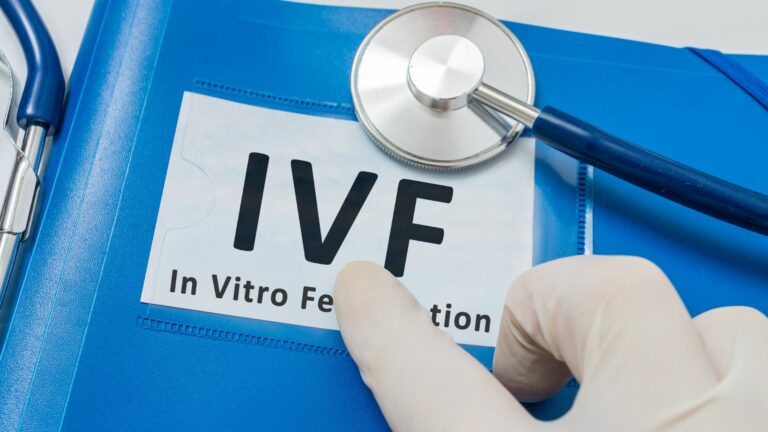
As you prepare for your first IVF consultation in India, it’s normal to feel overwhelmed by the unknowns of the process.
This guide aims to equip you with the knowledge and questions to ask, ensuring you make the most of this crucial first step in your IVF journey.
Key Takeaways
| Insight | Explanation |
|---|---|
| Pinpoint the cause of infertility | A clear diagnosis personalizes your IVF treatment plan and maximizes success rates. |
| Understand the IVF process | Familiarize yourself with the stages of IVF to navigate the journey effectively. |
| Ask the right questions | Prepare a list of questions to address your concerns and gather essential information. |
| Consider success rates and costs | Discuss clinic-specific success rates and get a detailed breakdown of the costs involved. |
Understanding Your Infertility
The first step in your IVF journey is pinpointing the cause of infertility. Common factors in India include:
- Female Factors: Ovulation disorders (PCOS, diminished ovarian reserve), tubal blockage, endometriosis, uterine fibroids
- Male Factors: Low sperm count, poor sperm motility, sperm abnormalities
- Unexplained Infertility: Affects approximately 20-30% of couples
Your fertility specialist will recommend diagnostic tests to uncover the reasons behind your infertility:
- For Women:
- Hormone testing: FSH (Follicle-Stimulating Hormone), LH (Luteinizing Hormone), and AMH (Anti-Müllerian Hormone) tests assess ovarian function and egg quantity.
- Ultrasound scans: Transvaginal ultrasounds evaluate the uterus, ovaries, and follicle development.
- Hysterosalpingogram (HSG): An X-ray procedure that checks for blockages in the fallopian tubes.
- For Men:
- Semen analysis: Assesses sperm count, motility (movement), and morphology (shape) to determine sperm quality.
Asking the Right Questions
When discussing your diagnosis with your doctor, consider asking:
- “We’ve been trying to conceive for [length of time]. What specific tests will you use to uncover the reasons behind our infertility?”
- “How will our individual diagnoses impact the IVF treatment plan and our likelihood of success?”
- “Are there any lifestyle changes or alternative therapies you recommend alongside IVF to improve our chances?”
Remember, a clear understanding of the cause of infertility is crucial for personalizing your IVF treatment plan and maximizing success rates.
Don’t hesitate to ask for clarification or additional information during your consultation.
The IVF Process in India
Understanding the different stages of IVF empowers you to navigate the process effectively. During your first consultation, discuss the following stages with your fertility specialist:
- Initial Consultation and Evaluation: This involves discussing your medical history, infertility diagnosis, and expectations with your fertility specialist. They will recommend tests to assess your suitability for IVF and determine the most effective treatment plan.
- Ovarian Stimulation: Fertility medications are administered to stimulate egg production in the ovaries. Regular monitoring through blood tests and ultrasound scans ensures optimal follicle growth.
- Egg Retrieval: A minimally invasive procedure performed under sedation, where mature eggs are collected from the follicles.
- Sperm Retrieval: A semen sample is obtained for sperm analysis and preparation.
- Fertilization: In conventional IVF, sperm and eggs are combined in a laboratory dish for fertilization to occur naturally. ICSI (Intracytoplasmic Sperm Injection) may be recommended in certain cases, where a single sperm is directly injected into the egg.
- Embryo Culture: Fertilized eggs are monitored for cell division and development into embryos over several days.
- Preimplantation Genetic Diagnosis (PGD) (optional): This advanced test can be performed on embryos to identify any genetic abnormalities, increasing the chances of a healthy pregnancy.
- Embryo Transfer: One or two healthy embryos are carefully selected and transferred back into the woman’s uterus using a thin catheter.
- Luteal Phase Support: Medications like progesterone are administered to support the uterine lining and improve embryo implantation.
- Pregnancy Test: Approximately two weeks after embryo transfer, a blood test is performed to confirm pregnancy.
Essential Questions for Your First Consultation
- “What diagnostic tests will be performed to assess our candidacy for IVF?”
- “Can you explain the different IVF treatment protocols available and which one might be best suited for us?”
- “What medications will be used for ovarian stimulation, and what are the potential side effects?”
- “What is the success rate of egg retrieval in my case?”
- “What are the different sperm retrieval methods, and what is typically recommended?”
- “How many embryos are typically developed for transfer?”
- “What are the benefits and considerations of PGD testing?”
- “What factors influence the decision on the number of embryos to be transferred?”
- “What medications will be prescribed during the luteal phase?”
- “When can I expect to take a pregnancy test?”
Ask your fertility specialist to walk you through each stage in detail, addressing your specific concerns and providing a clear timeline for your IVF cycle.
Success Rates and Costs
During your first consultation, discuss the clinic’s success rates and the costs involved in IVF treatment.
Understanding Success Rates
Nationally recognized clinics in India often quote success rates between 35% and 40%, but these rates are based on cycles initiated and not necessarily live births.
Your personal success rate depends on factors like:
- Age: Younger women (under 35) generally have higher success rates due to better quality eggs.
- Cause of Infertility: Conditions like endometriosis or blocked fallopian tubes may require additional procedures.
- Quality of Eggs and Sperm: The health of eggs and sperm significantly impacts embryo development and implantation.
- Number of Embryos Transferred: While transferring more embryos increases pregnancy chances, it also raises the risk of multiple births.
Asking the Right Questions About Success Rates
- “Can you explain how you calculate your clinic’s success rates, and what data is included?”
- “Based on our age and diagnosis, what is a realistic estimate of our success rate for achieving pregnancy through IVF?”
- “Are there any additional factors we should consider that might influence our individual chances?”
Remember, success rates are complex, and clinics may report them differently. Focus on a clinic’s experience with cases similar to yours and their live birth rates.
Ensure your chosen clinic adheres to the guidelines and regulations established by the Indian Council of Medical Research (ICMR) for Assisted Reproductive Technologies (ART) clinics.
Demystifying IVF Costs
The cost of IVF treatment in India can vary depending on several factors:
- Clinic fees: Consultation charges, doctor fees, lab fees, and operation theatre expenses.
- Medications: The type and duration of fertility medications used for ovarian stimulation.
- Additional Procedures: ICSI, PGD testing, blastocyst culture (culturing embryos for 5-6 days before transfer) can add to the overall cost.
- Number of IVF cycles: Success may not be achieved in the first cycle, and additional attempts can increase the total cost.
Essential Questions Regarding Costs
- “Can you provide a detailed breakdown of the estimated costs involved in an IVF cycle at your clinic?”
- “Are there any hidden costs or additional charges I should be aware of?”
- “Do you offer any financing options or payment plans to help manage the cost of IVF?”
- “What is the cost difference between conventional IVF and ICSI?”
- “How much do additional procedures like PGD testing or blastocyst culture add to the overall cost?”
Be sure to get a transparent and detailed breakdown of all costs involved in your IVF treatment plan.
Discuss any financial concerns openly with your fertility specialist and explore financing options or payment plans that may be available.
Preparing for Your First Consultation
To make the most of your first IVF consultation, take the following steps:
- Research and Shortlist Clinics: Look for fertility clinics with experienced IVF specialists, high success rates, and a reputation for personalized care. The Indian Society of Assisted Reproduction is a good resource to find certified clinics.
- Gather Medical Records: Compile your and your partner’s medical history documents, including any previous fertility tests or treatments, to share with your fertility specialist.
- Prepare Questions: Write down a comprehensive list of questions covering all aspects of IVF, from diagnosis and treatment options to success rates and costs. Having a prepared list ensures you don’t forget any important concerns.
- Discuss with Your Partner: Have an open conversation with your partner about your expectations, concerns, and financial considerations before the consultation. Being on the same page can help you make informed decisions together.
- Keep an Open Mind: While it’s essential to be informed, approach the consultation with an open mind. Your fertility specialist may provide insights or recommendations you hadn’t considered based on their expertise and your unique situation.
Remember, your first IVF consultation is an opportunity to build a relationship with your fertility specialist. Don’t hesitate to ask questions, express your concerns, and seek clarification on any aspect of the treatment plan.
IVF Centers in India
If you’re considering IVF treatment in India, here are some locations where you can find reputable IVF centers:
- IVF Centers in Bikaner
- IVF Centers in Kolapur
- IVF Centers in Siliguri
- IVF Centers in Ambattur
- IVF Centers in Udaipur
- IVF Centers in Sangli-Miraj-Kupwad
- IVF Centers in Belgaum
- IVF Centers in Jalgaon
Remember to research and compare different clinics based on factors like success rates, experience of the medical team, patient reviews, and costs before making a decision.
Conclusion
Your first IVF consultation is a crucial step in your journey towards parenthood. By understanding the causes of infertility, the stages of IVF, success rates, and costs, you can make the most of this initial discussion with your fertility specialist.
Prepare thoroughly by researching clinics, gathering medical records, and preparing a list of questions.
Be open and honest about your concerns and expectations, and don’t hesitate to seek clarification on any aspect of the treatment plan.
Remember, IVF is a collaborative effort between you and your fertility specialist. With the right preparation and mindset, you can approach your first consultation with clarity and confidence, setting the stage for a successful IVF journey.
Wishing you all the best as you take this important first step towards building your family!






